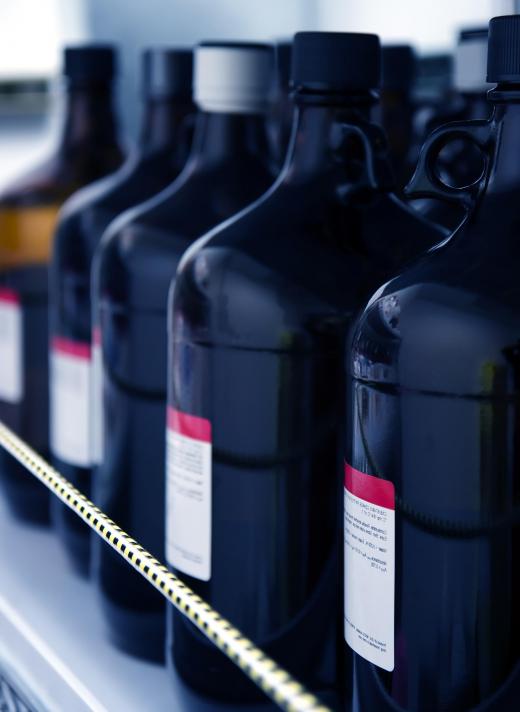What Is Dilute Sulfuric Acid?
Dilute sulfuric acid is any mixture of sulfuric acid that has less than a 10 percent sulfuric acid concentration. Unlike its counterpart, concentrated sulfuric acid, the diluted variety of sulfuric acid is not syrupy and is very stable, so it looks dangerously similar to water. It also is colorless, odorless and corrosive.
In chemistry, dilute sulfuric acid is considered 1M sulfuric acid. The molarity (M) is considered the number of moles of a solute per liter of solvent. A mole is a measurement of how many atoms or molecules there are.

Water is the most commonly used solvent when making sulfuric acid, and the concentrated solute usually arrives in the form of concentrated sulfuric acid. Even diluted, sulfuric acid is still a powerful acid, meaning that it can dissolve more by adding hydrogen ions to water. It is used in many industries but can cause severe burns and corrosion of most materials with which it comes into direct contact.
The most common event for burn accidents comes for diluting the sulfuric acid itself. The proper way is always adding less concentrated to more concentrated. Most of the time, sulfuric acid needs to be added to water to make a specific molarity.

Using a wide beaker allows for the heat to be dispersed over a larger volume, but this mixing can actually cause heat to increase to more than 212° Fahrenheit (100° Celsius). The heat comes from the sulfuric acid’s extra protons slamming into water, forming the hydronium ion.
The chemistry involving dilute sulfuric acid is much different from concentrated sulfuric acid. As an acid, it behaves as a catalysis, or helps reactions happen without reacting itself. This is because it does not completely dissociate, like concentrated sulfuric acid does. By using diluted sulfuric acid in special reactions, certain helpful byproducts are created, whereas concentrated sulfuric acid would not produce these other products. The example of this sparked the revolution that drove sulfuric acid to its current position as the most-used chemical in industry.
The process to produce sodium carbonate, or soda ash, with dilute sulfuric acid was developed in 1790. If concentrated too much, no sodium carbonate would form, only sodium bicarbonate, or baking soda. At the time, this was not well known because only very diluted sulfuric acid was produced and used in the process.
AS FEATURED ON:
AS FEATURED ON:












Discuss this Article
Post your comments